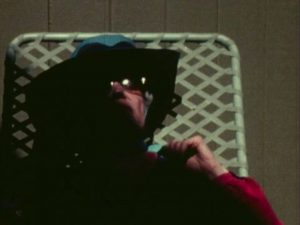An alternate version of my essay on the Costa film, written in May 2020 for Trafic. — J.R.

It isn’t necessary to have seen anything else by Pedro Costa before encountering his title heroine in a film of her own, but if you saw his previous feature, Horse Money, you’ve already met her—a striking, angry middle-aged woman from Cape Verde who finally found the money to fly to Lisbon to join her long-absent husband, only to discover that she just missed his funeral. Settling into his rickety, crumbling house and trying to come to terms with her grief, keeping company mainly with a semi-mad priest (Costa regular Ventura), she’s precisely the kind of person that the world and movies tend to ignore and evade, yet Costa’s epic portraiture, beautifully lit and framed so that it builds an exalted altar to her, invites us to luxuriate in her hushed presence. Audiences tend to have an easier time with this dark reverie than critics because it takes us somewhere very special and respects us far too much to tell us why.
How to explain the appeal of a movie named after a real person, a displaced “non-professional” who is also its star? Read more
From the Chicago Reader (May 1, 1990). — J.R.

The four films to date of independent Chicago filmmaker Peter Thompson form two diptychs: not films to be shown simultaneously side-by-side, but successive works whose meanings partially arise out of their intricate inner rhymes and interactions. Two Portraits (1982), which has already had limited exposure in Chicago, describes the filmmaker’s parents: Anything Else, devoted to his late father, combines stop-frame images of the latter, in an airport and outdoors, with a painful recording of his voice taken in a hospital and a multifaceted verbal portrait delivered by his son; Shooting Scripts juxtaposes the filmmaker’s mother, Betty Thompson, reading from her own diaries with a minimalist view of her sleeping on a beach chair, alternating stop-frames with privileged moments of movement. Together these films create a rich tapestry, but the more recent hour-long pair, Universal Hotel and Universal Citizen (1987), receiving its premiere here, creates a still more ambitious and dense interweaving of objective and subjective elements. As Thompson puts it, this diptych deals with three main themes: the emotional thawing of men by women, the struggle to disengage remembrance from historical anonymity, and nonrecoverable loss. In the first film, Thompson describes his involved research about medical experiments in deep cold conducted on a Polish prisoner and a German prostitute by Dr. Read more
It’s infuriating to keep hearing people smugly and narcissistically remark on TV about what a “historic” period we’re currently living through. Presumably this is in sharp contrast to their (i.e., our) less significant predecessors. Yet truthfully, what these people really seem to mean by “historical” is “hysterical”. [12/18/20] Read more



